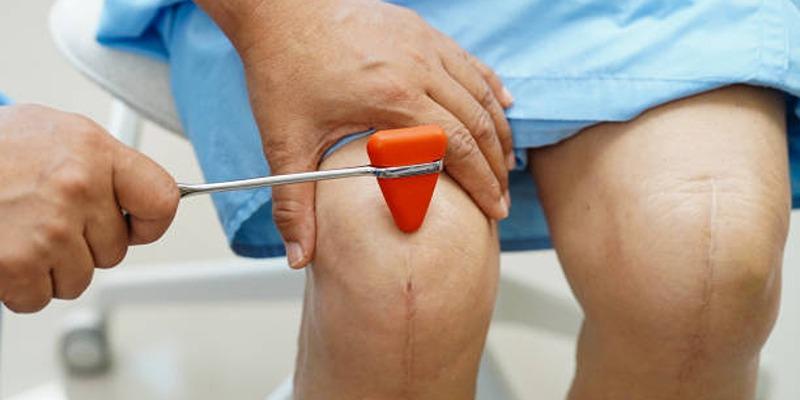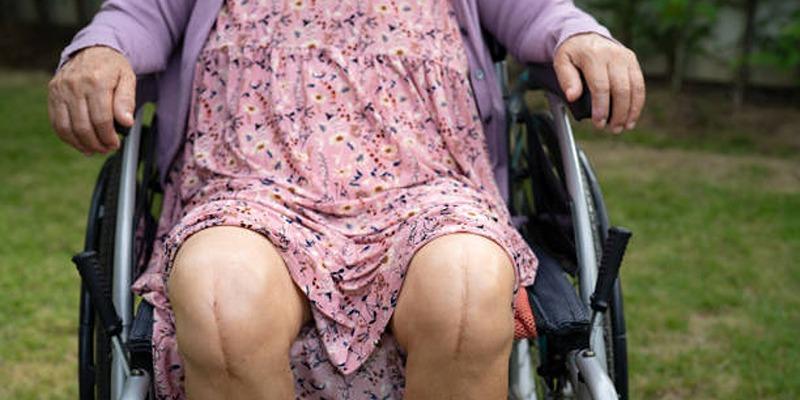Making the Right Choice: Total Knee Replacement Decision
Total knee replacement (TKR) is a major surgery that replaces a damaged knee joint with an artificial one, often recommended for severe arthritis, injury, or wear and tear. This procedure helps restore mobility and improve quality of life for those struggling with daily activities like walking or climbing stairs.
Signs That You Might Need Total Knee Replacement
 Several patients with knee discomfort do not require surgical procedures for their condition. People deal with their knee problems by using prescription drugs as well as rehabilitation treatments and programs to control weight and perform less strenuous exercises. You should consider total knee replacement if your knee pain is intense combined with unresponsive treatments. People suffering from significant joint damage find relief through this surgical procedure which alleviates pain alongside enhancing joint movement.
Several patients with knee discomfort do not require surgical procedures for their condition. People deal with their knee problems by using prescription drugs as well as rehabilitation treatments and programs to control weight and perform less strenuous exercises. You should consider total knee replacement if your knee pain is intense combined with unresponsive treatments. People suffering from significant joint damage find relief through this surgical procedure which alleviates pain alongside enhancing joint movement.
Here are signs that surgery might be needed:
- Constant pain: Pain that won’t go away, even when resting or sleeping, can mean serious joint damage or advanced arthritis. This kind of pain often disrupts sleep and daily activities.
- Trouble walking or climbing stairs: If walking, standing, or climbing stairs is painful or unstable, it could mean your knee joint is too damaged to function well.
- Swelling and stiffness: Swelling and stiffness that don’t improve with medication, ice, or anti-inflammatory treatments may mean the knee joint is beyond repair.
- Limited range of motion: If you can’t bend or straighten your knee properly, it might make everyday tasks like sitting or getting out of a car difficult. This could mean severe joint damage.
- Relying on pain medication: Using painkillers regularly to get through the day isn’t a long-term solution and might indicate surgery is necessary.
- Knee deformity: If your knee looks misaligned, bowed, or deformed, it can affect how you walk and strain other joints and muscles. Surgery can help fix this.
If you have these symptoms and other treatments aren’t working, it’s a good idea to talk to an orthopedic specialist. A total knee replacement can help reduce pain, improve mobility, and enhance your quality of life.
Weighing the Pros and Cons of Knee Replacement
The decision to undergo knee replacement should be based on a clear understanding of its benefits and challenges.
Benefits of Total Knee Replacement
- Pain relief: The biggest benefit of knee replacement is that it significantly reduces or eliminates chronic knee pain, allowing people to return to a more active lifestyle.
- Improved mobility and function: Many patients experience increased mobility and can walk, stand, and even participate in light exercise without discomfort.
- Better quality of life: Simple tasks like getting in and out of a car, grocery shopping, and walking in the park become easier after knee replacement.
- Durable and reliable: Contemporary knee implants are designed to last 15 to 20 years or longer, offering enduring relief from knee pain and improved functionality.
- Reduced dependence on pain medication: With a functioning knee joint, most patients no longer need regular painkillers.
Challenges and Risks of Knee Replacement
- Recovery takes time: It can take months to fully recover from the surgery, and some discomfort may persist during rehabilitation.
- Strict rehabilitation program: Physiotherapy is essential for regaining strength and mobility after surgery, and skipping it can lead to poor outcomes.
- Possible complications: Although rare, risks such as infection, blood clots, and implant failure can occur. It is important to follow post-surgery care guidelines to minimize these risks.
- Uncertain outcomes: While most people experience significant pain relief, some may still have minor discomfort or stiffness even after surgery.
Preparing for Total Knee Replacement
Proper preparation can make a big difference in the success of knee replacement surgery. It is important to be both physically and mentally ready for the procedure and the recovery that follows.
Consulting a Specialist
Before deciding on surgery, consult an orthopaedic surgeon. They will examine your knee, discuss your symptoms, and determine if knee replacement is the best option. They will also explain the procedure, answer any questions, and set realistic expectations about the recovery process.
Pre-Surgery Health and Fitness
Being in good physical condition before surgery can help you recover more quickly. Here are some important steps to take:
- Strengthening exercises: Strengthening the muscles around the knee can provide better support and improve post-surgery recovery.
- Maintaining a healthy weight: Carrying extra weight puts additional stress on the knee, so losing excess weight before surgery can improve outcomes.
- Quitting smoking: Smoking can slow down healing and increase the risk of complications, so it is advisable to stop smoking before surgery.
- Managing chronic conditions: If you have conditions like diabetes or high blood pressure, keeping them under control can reduce the risk of complications during and after surgery.
What to Expect During and After Surgery
 Getting knee replacement surgery is a big step toward less pain and better movement. It’s a common procedure that can improve life for people with serious knee problems. Knowing what happens during and after surgery can help you feel ready and confident.
Getting knee replacement surgery is a big step toward less pain and better movement. It’s a common procedure that can improve life for people with serious knee problems. Knowing what happens during and after surgery can help you feel ready and confident.
What Happens During Surgery?
Knee replacement surgery usually takes 1–2 hours. The doctor removes the damaged parts of your knee and replaces them with metal and plastic parts that work like a healthy knee. You’ll get either spinal anesthesia (numbs your lower body) or general anesthesia (puts you to sleep). Sometimes, surgeons use robotic tools to make the procedure more precise.
Right After Surgery
After surgery, you’ll stay in the hospital for a few days so doctors can monitor you and manage your pain. Physical therapy usually starts within 24 hours to help prevent stiffness and blood clots. A therapist will guide you through simple exercises like bending your knee or standing with a walker. Managing pain and starting therapy early are important for getting you back on your feet.
Recovery and Rehabilitation
- First few weeks: You will need a walker or crutches for support, and physiotherapy will start immediately. Regular movement is encouraged to prevent complications.
- First three months: By this time, most patients regain mobility and can perform daily activities with minimal discomfort. Physiotherapy continues to strengthen the knee and improve flexibility.
- Six months to a year: The knee should feel stronger, and most patients can return to normal activities, including light exercise and longer walks.
Conclusion:
Total knee replacement surgery can be a life-changing solution for those living with chronic knee pain and restricted mobility. This procedure provides long-term relief from pain, enhances mobility and function, and reduces reliance on pain medications. However, it’s essential to understand the potential risks and challenges involved. Proper physical and mental preparation is key to achieving the best possible outcome from this transformative surgery.












